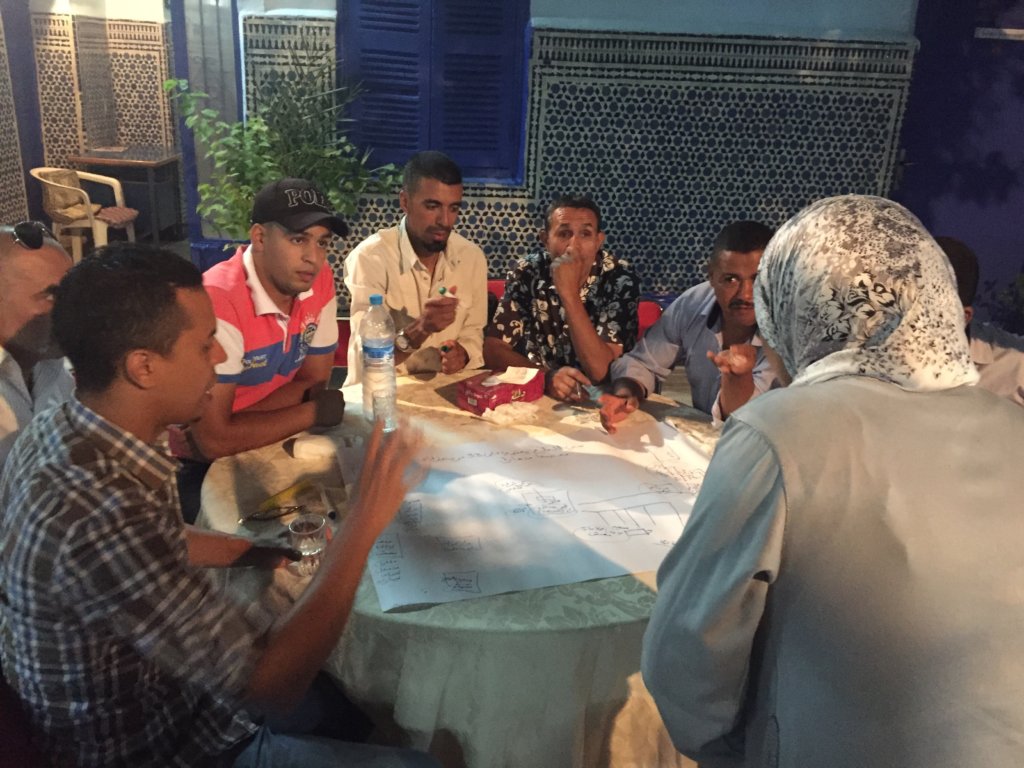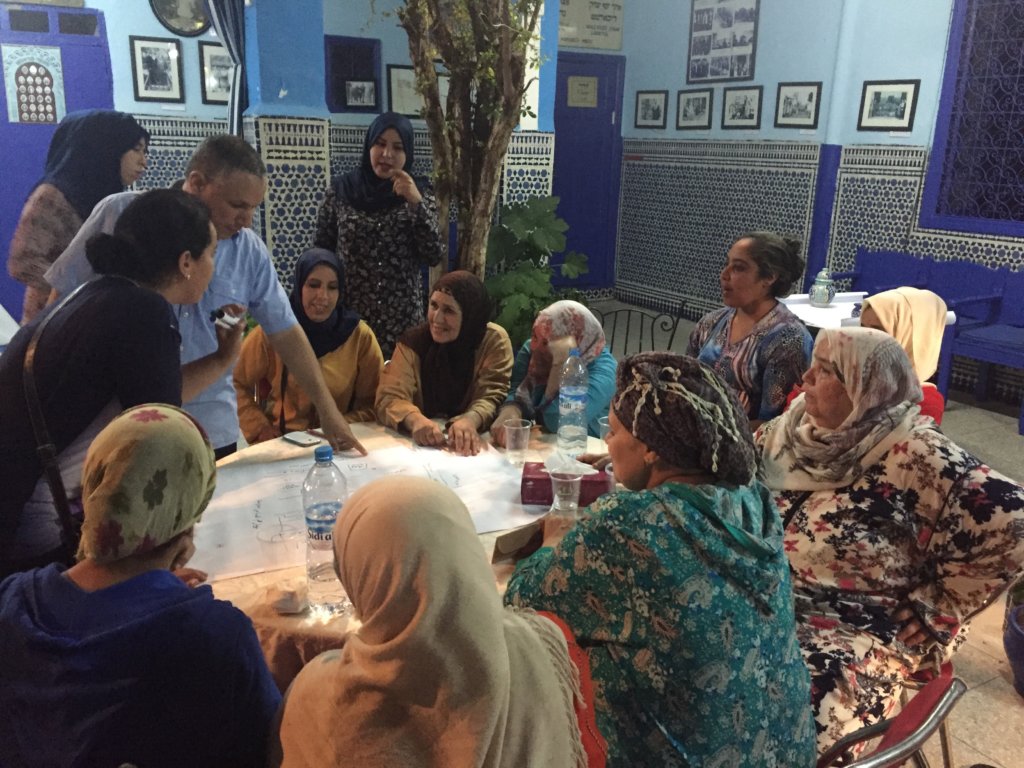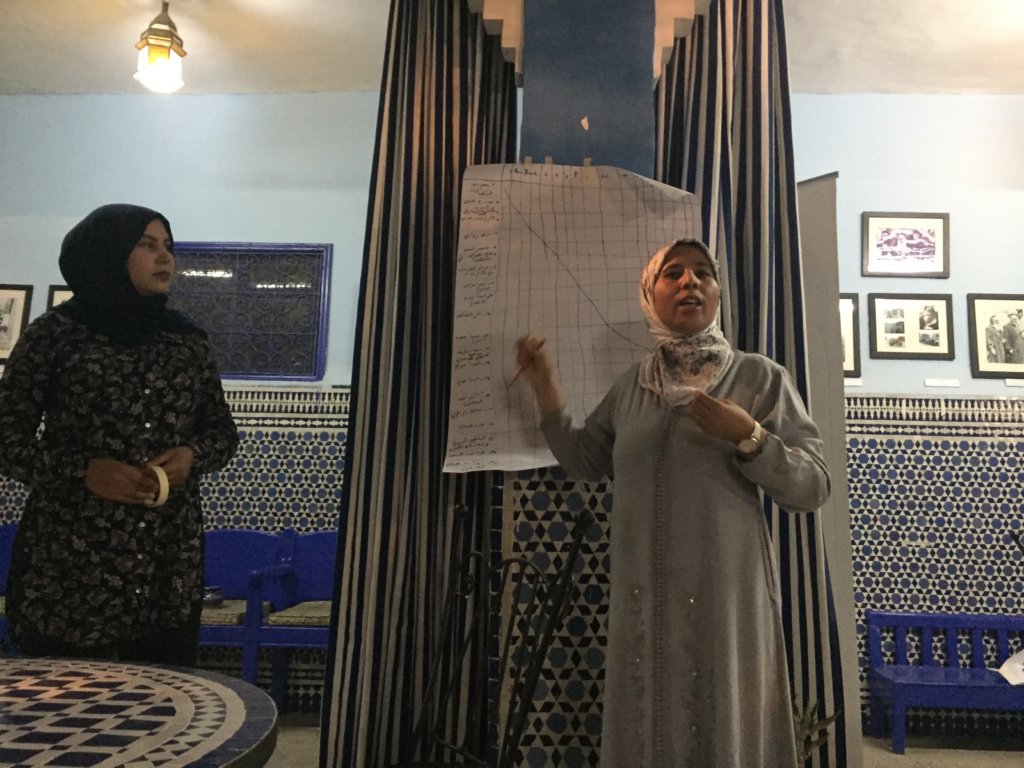By Yossef Ben Meir | President of High Atlas Foundation
Community Meetings at the Marrakech Mellah
Having started during the holy month of Ramadan, the High Atlas Foundation is hosting a series of community meetings in the Mellah neighborhood of Marrakech to prioritize local needs and establish a path for a sustainable future.
In coordination with the Mimouna Foundation, Jewish Community of Marrakech, Region of Marrakech-Sofi and the Bahia neighborhood, HAF hosted a series of traditional Moroccan breaks of fast with the local community in order to foster participatory development action.
Immediately following these interfaith meals at the Slat Lazama synagogue, local residents and organization leaders developed plans to achieve new projects - in clean drinking water, education and building revitalization. HAF implements grassroots development initiatives that community beneficiaries determine and manage.
HAF and Partners Facilitate Renewal of the Historic Marrakech Mellah
Over traditional Iftor meals during Ramadan, HAF, Association Mimouna, Jewish Community of Marrakech and the Region of Marrakech-Sofi brought together community members throughout the Mellah at the Slat Lazama Synagogue to collectively discuss the community’s needs and their hopes for the future.
“What we are talking about are not luxuries, they are simple human rights. We want to have access to water to drink, we want a school for our kids to attend, we want a hospital that we can go to when we are sick, and we want police in our neighborhood that ensure our security. I do not think that this is asking for too much, all other neighborhoods in Marrakesh have these things; why don’t we?” asked one community member.
Community members highlighted that while there was once “no difference between the Jews and the Muslims who lived here,” the community now struggles with a significant lack of resources. Fatiha, a local mother said: “The kids here don’t have many choices; the schools are nonexistent, and they do not trust the local authorities. There are no jobs and they are in the streets all day, they all are turning to drugs and alcohol to forget their struggles. I do not know what we can do.”
In order to attempt to mitigate some of these significant problems, Amina, a facilitator with the High Atlas Foundation, led a series of community activities aimed at mapping what the community looks like now, how it once was, and what it requires to improve for the future. Community members presented their plans to the rest of the group, focusing around the lack of renovation and the need for social services.
In particular, community members emphasized the need for infrastructure improvements: “We have a hospital, but there are no beds in it,” and further they emphasized, “our houses are full of mold and they are falling apart.” Without this infrastructural renovation, the Mellah is suffering. Moreover, community members also highlighted that, “every other neighborhood in Marrakesh has a police force, they stop drugs from being given out, and they also arrest thieves. Here both of those things run wild.” As the Mellah has become more marginalized in Moroccan society, it has lacked the most basic resources to provide for its citizens.
The conversations continued to lead back to the need for the most basic infrastructure amelioration. With little access to running water, the discussions continued to return to the notion that they must first and foremost increase access to water and establish standards that ensure the hygiene of water. Yet, this prioritization just touches at the surface of the Mellah’s needs. While they hope to establish a system of clean water, they are also adamant that the community needs renovations that can bring it back to the center of vitality that it once was.
The High Atlas Foundation is moved and inspired by the conversations occurring at the Mellah and hopes to truly help increase the living standards with the people living in the Mellah. Moreover, HAF ensures that any help it offers to human development occurs through the participatory approach, empowering the community members of the Mellah to implement their solutions.
Planning, partnership-building, proposal development all continue. We are committed to the Mellah's community development vision.
To learn more about these meetings and about HAF's role, check out this video and the blog posts below.
Project reports on GlobalGiving are posted directly to globalgiving.org by Project Leaders as they are completed, generally every 3-4 months. To protect the integrity of these documents, GlobalGiving does not alter them; therefore you may find some language or formatting issues.
If you donate to this project or have donated to this project, you can receive an email when this project posts a report. You can also subscribe for reports without donating.


